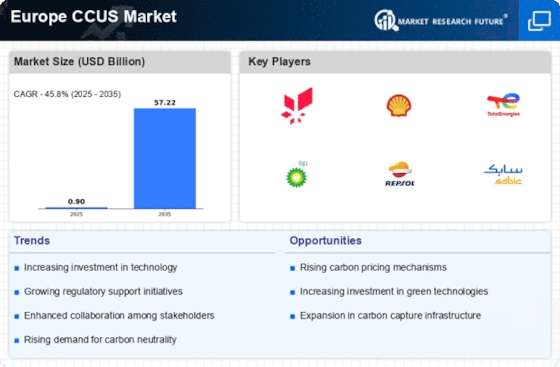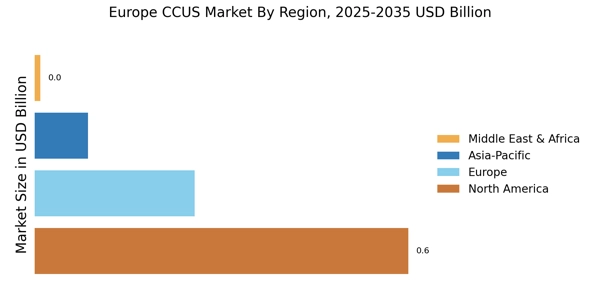Stringent Environmental Regulations
The Europe Carbon Capture Utilization Storage Market is significantly influenced by stringent environmental regulations imposed by European governments. The European Union has established ambitious climate targets, including a reduction of greenhouse gas emissions by at least 55% by 2030 compared to 1990 levels.
These regulations create a pressing need for industries to adopt carbon capture technologies to comply with legal requirements. As companies face potential penalties for non-compliance, the demand for carbon capture solutions is likely to increase. This regulatory landscape not only drives market growth but also encourages innovation in carbon capture technologies, positioning Europe as a leader in sustainable practices.
Growing Public Awareness and Support
Public awareness regarding climate change and environmental sustainability is on the rise in Europe, positively impacting the Carbon Capture Utilization Storage Market. Citizens are increasingly advocating for effective climate action, prompting governments to prioritize carbon capture initiatives. Surveys indicate that over 70% of Europeans support the implementation of carbon capture technologies as a means to combat climate change.
This growing public support is likely to influence policymakers to allocate more resources towards carbon capture projects, thereby accelerating market growth. As societal pressure mounts, industries may feel compelled to adopt carbon capture solutions to align with public sentiment and enhance their corporate social responsibility.
Increased Investment in Green Technologies
The Europe Carbon Capture Utilization Storage Market is witnessing a surge in investments aimed at green technologies. Governments and private entities are channeling funds into carbon capture projects, driven by the European Union's commitment to achieving net-zero emissions by 2050. In 2025, investments in carbon capture technologies in Europe reached approximately 5 billion euros, reflecting a growing recognition of the need for sustainable solutions.
This influx of capital is likely to enhance research and development efforts, leading to innovative carbon capture methods and increased deployment across various sectors. As financial backing continues to grow, the market is expected to expand, fostering a robust ecosystem for carbon capture initiatives.
Advancements in Carbon Capture Technologies
Technological advancements play a crucial role in shaping the Europe Carbon Capture Utilization Storage Market. Innovations in carbon capture technologies, such as direct air capture and bioenergy with carbon capture and storage, are enhancing efficiency and reducing costs. In recent years, several pilot projects have demonstrated the feasibility of these technologies, leading to increased interest from both public and private sectors.
For instance, the development of more efficient solvents and membranes has the potential to lower the energy requirements for carbon capture processes. As these technologies mature, they are expected to drive market growth by making carbon capture solutions more accessible and economically viable for various industries.
International Collaboration and Funding Initiatives
The Europe Carbon Capture Utilization Storage Market benefits from international collaboration and funding initiatives aimed at addressing climate change. Various European countries are participating in joint projects and partnerships to share knowledge and resources related to carbon capture technologies. Initiatives such as the European Commission's Horizon Europe program provide substantial funding for research and innovation in carbon capture.
In 2025, funding for collaborative projects in this sector exceeded 1 billion euros, highlighting the commitment to advancing carbon capture solutions. This collaborative approach not only accelerates technological development but also fosters a sense of unity among European nations in the fight against climate change.

















